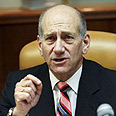

"In no way can I call such a decision a good decision. It's a painful affair," he noted.
The prime minister said that Ofer Dekel, his special envoy overseeing the negotiations, asked to examine the possibility of declaring Ehud Goldwasser and Eldad Regev dead, and that the publication of this information may be what prompted Hizbullah to accept the deal.
Olmert went on to explain why he decided to vote in favor of the deal, despite his doubts.
"I stand behind the decision with all my strength and belief. I did it although I knew I would be criticized. But I did it because I wanted the sons at home, and I particularly did not want to create a similar situation to that of (missing navigator) Ron Arad, whose condition is still unknown."
As for a future deal for the release of abducted soldier Gilad Shalit, the prime minister said, "The negotiations for Shalit are being finalized, and the solution won't be simple, easy or quick. Difficult decisions will have to be made here as well.
"I hope the nation unites now. We will know how to rise even when we are faced with masses of people rejoicing in the streets, after extorting these painful concessions from us."
Defense Minister Ehud Barak said shortly afterwards during a Labor faction meeting that the same principle of returning the sons home, alive or dead, "will guide us in the talks on Shalit and in the negotiations which are expected to be launched as a result of the truce.
"I want us to know that this ceasefire is what allows us to hold these negotiations today, and I hope we will manage to make progress in the negotiations for Shalit's return and to see him back home," Barak added.















